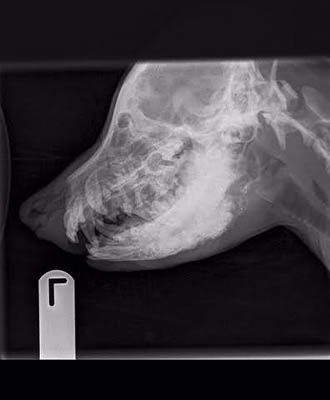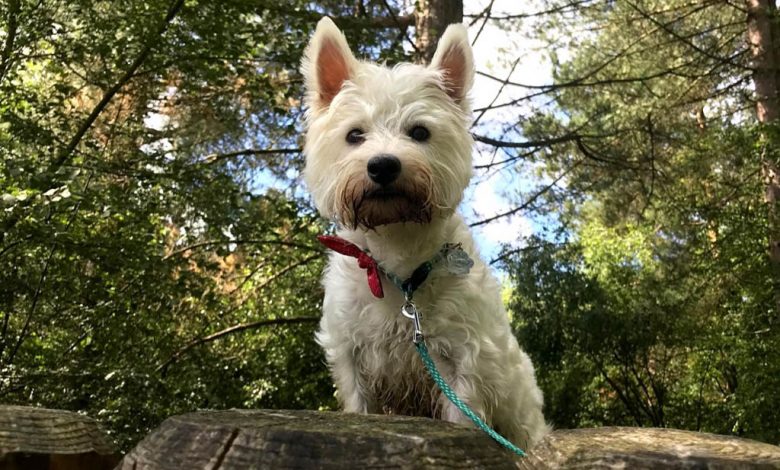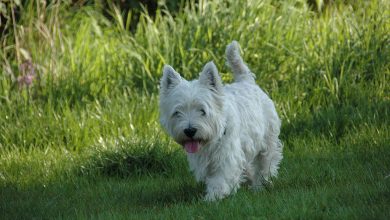Westie Jaw Disease – Do You Know the Signs?
Wendy has always been cuddlier than your average Westie. She slept most of the time as a puppy instead of darting around causing mayhem. As the smallest, fluffiest and most timid of the litter, I knew she was meant to be mine.
Until Wendy was 8 months old, she had the typical Westie spirit – she was stubborn, strong willed and found joy in everything – but one day she didn’t want to get out of her bed, her jaw began to open less, and she struggled to eat her kibble. My family and I took her to the vet after two days of lethargy to be told she may have Westie Jaw – a buildup of bone around the head of a dog which can be fatal if the jaw joints become fused. X-rays revealed that her jaw was double the size it should be and the fact that she could even slightly open her jaw surprised everyone. We were given a week of anti-inflammatory drugs and told to return when Wendy had finished them. Due to her having the most severe case of westie jaw any of the vets had seen, they suggested experimental treatment which could include her whole lower jawbone would be removed and replaced. I didn’t feel it would be fair for her to go through this.
When we returned the following week, she was a completely different dog. It felt like she was making up for her lack of chaotic puppy, bouncing around and showing interest in everything. It was clear that she had been in pain for a long time.
During her first year she spent a great deal of quality time with us, receiving nonstop attention. She flourished during this time and her personality blossomed. It was clear that she was happier now. She began talking in the Westie “woo woo” language and has since never failed to put a smile on my face. By her first birthday she had been completely weaned off her medicine

Wendy’s symptoms included excessive dribbling, a very hot jaw, a painful lump on her head and difficulty yawning to name a few. What really stood out were the small cyst-like lumps around her neck when she was 4 months old. They were squishy but seemed to disappear after a week. Looking back on it all, she could have been diagnosed earlier if I knew what to look for. Westie jaw, otherwise known as lions jaw or craniomandibular osteopathy, can affect all dog breeds but is more present in the Westie bloodline. It can go unnoticed, or it can cause extreme pain for the dog.
As a first-time dog owner, I found this ordeal tough as I had no prior experience with dogs, let alone a puppy with a rare genetic disease. The uncertainty was almost unbearable as I could not imagine losing what had already become a huge part of my life. It was a desperate search through social media that brought me to a lady whose own Westie had suffered too. Both our Westies had similar encounters with this disease. Due to the rarity of Westie Jaw I struggled to find someone else who had any knowledge. Advice from someone who has experienced this firsthand was encouraging because we could talk through our emotions and in the end, we agreed that the bond with your Westie becomes stronger when you get through something like this together. It was comforting to know that Wendy was not alone and the support we received from the Westie community was remarkable.
I have spent the last year offering help and guidance to those who like myself have a puppy suffering from Westie Jaw and are unsure on symptoms and remedies. Westie Jaw is fortunately very rare, however, this means that there is limited research on treatment and a lack of knowledge surrounding the nature of this disease.

As of now there is no treatment, only pain management. However, the bone growth does recede up until the dog is two years old. During this period small fragments of bone break off and dissolve leaving the dog with the same symptoms as when the bone was forming. Unfortunately, there is no way of predicting this disease but if the pain can be managed your Westie will live a long and happy life.
Since her diagnosis last May, Wendy has regained her Westie spirit and our bond has become stronger than I could ever imagine. Her second birthday is in September and by then she should be free from any pain caused by her Westie jaw. Despite her occasional off days, she enjoys long woodland walks and trips to the pub – living life the way a Westie should.






